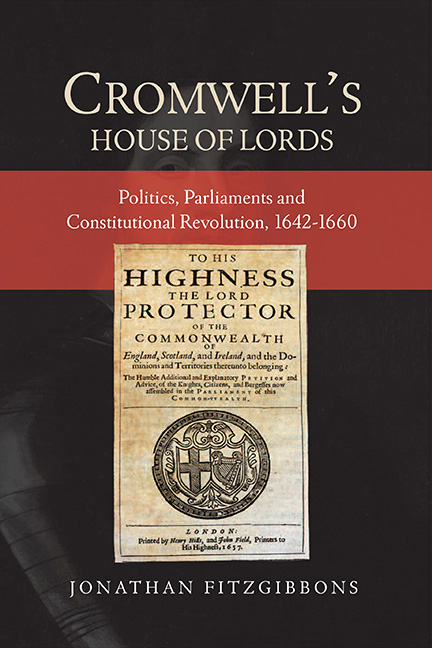Book contents
- Frontmatter
- Contents
- Acknowledgements
- Abbreviations
- Introduction
- 1 Parliamentarian Thought and the Abolition of the House of Lords, 1642–49
- 2 Oliver Cromwell, the Other House and the Humble Petition and Advice
- 3 The Membership of the Other House
- 4 The Other House and the Second Session of the Second Protectorate Parliament
- 5 Richard Cromwell, the Third Protectorate Parliament and the Other House Debates
- 6 The Other House, the Army and the Search for a Settlement
- Conclusion
- Appendix: The Membership of the Other House
- Bibliography
- Index
- Studies in Early Modern Cultural, Political and Social History
3 - The Membership of the Other House
Published online by Cambridge University Press: 05 May 2018
- Frontmatter
- Contents
- Acknowledgements
- Abbreviations
- Introduction
- 1 Parliamentarian Thought and the Abolition of the House of Lords, 1642–49
- 2 Oliver Cromwell, the Other House and the Humble Petition and Advice
- 3 The Membership of the Other House
- 4 The Other House and the Second Session of the Second Protectorate Parliament
- 5 Richard Cromwell, the Third Protectorate Parliament and the Other House Debates
- 6 The Other House, the Army and the Search for a Settlement
- Conclusion
- Appendix: The Membership of the Other House
- Bibliography
- Index
- Studies in Early Modern Cultural, Political and Social History
Summary
… it was granted I should name another House, and I named it of men that should meet you wheresoever you goe, and shake hands with you, and tell you it is not titles, nor Lords, nor party they value, but a Christian and an English interest; men of their own ranke and quality, who would not only be a ballance unto you, but to themselves while you love England and Religion.
These words, reportedly delivered by Cromwell at the dissolution of the second Protectorate Parliament on 4 February 1658, seem to offer a crucial insight into his motives when nominating the Other House. This chapter explores in detail those men nominated by Cromwell to sit in the new parliamentary chamber to see whether they bear out his claims. The first section examines the nomination process: if Cromwell's later assertions are to be verified it is first important to assess whether the membership really was of his own choosing. The core of the chapter then focuses upon those nominated to better understand the complexion of the Other House. It suggests that, on a number of levels, Cromwell's choices ensured that the Other House would be a ‘balance … to themselves’.
The Nomination Process
Cromwell's choice of members was the matter of prolonged speculation. A fortnight after his second investiture on 26 June, there were already indications that he was sounding out candidates. Given that parliament had adjourned until 20 January 1658, however, Cromwell was apparently in no rush to make his choices. Not until late autumn did rumours of impending nominations intensify. Edward Montagu reported to Henry Cromwell on 5 December that ‘the list of the other house is every day expected’, but he knew ‘nothinge of the persons designed for it’. Time was running out. As Thurloe informed Henry on 1 December, ‘there are but 7 or 8 dayes left for the finall resolution, there being a necessitye, that the writs issue 40 dayes before the parliament meets’. Yet, Thurloe believed there was ‘not yet any one man fully resolved upon’. By 9 December one newsletter even reported that ‘the members of the other House (its said) will not be named’.
- Type
- Chapter
- Information
- Cromwell's House of LordsPolitics, Parliaments and Constitutional Revolution, 1642–1660, pp. 78 - 121Publisher: Boydell & BrewerPrint publication year: 2018

